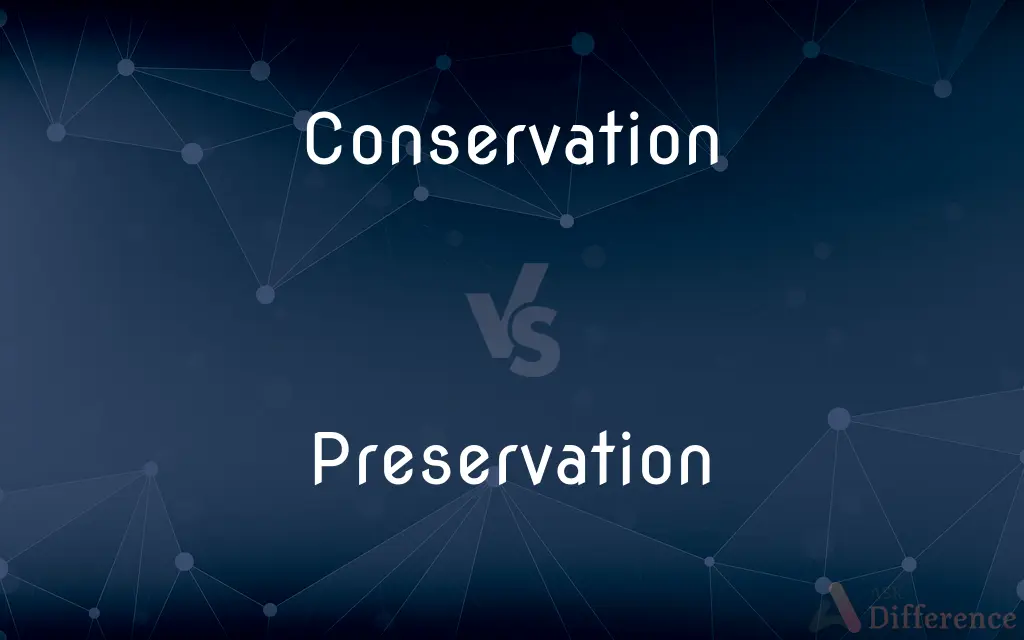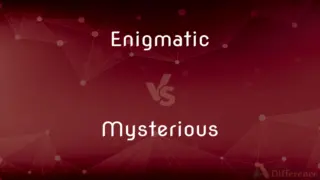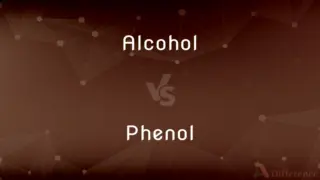Conservation vs. Preservation — What's the Difference?
By Tayyaba Rehman — Updated on October 7, 2023
Conservation focuses on the sustainable use and management of natural resources, while preservation emphasizes the protection of habitats, species, and landscapes in their natural state.

Difference Between Conservation and Preservation
Table of Contents
ADVERTISEMENT
Key Differences
Conservation and Preservation both emphasize the importance of protecting the environment. Conservation involves the prudent and sustainable use of natural resources to ensure they last for future generations. Preservation, on the other hand, aims at maintaining or restoring the natural state of the environment, avoiding human interference as much as possible.
Conservation and Preservation play significant roles in environmental protection. Conservation strategies might involve sustainable hunting or logging, where the activities are controlled and balanced. Preservation strategies often involve creating protected zones, like national parks or wildlife sanctuaries, where no hunting, logging, or other potential damages can occur.
The principles of Conservation and Preservation can be applied in various sectors. Conservation is typically more flexible, allowing for certain interventions as long as they don’t deplete the resource. Preservation usually involves stricter measures, like preventing any human interference that might alter the existing state of a place or species.
Conservation and Preservation sometimes overlap in their objectives and methods. However, the primary distinction lies in the approach. Conservation allows for resource use, but it should be responsible and sustainable. Preservation looks at completely safeguarding and ensuring no exploitation or alteration of the environment.
Advocates of both Conservation and Preservation believe in the inherent value of nature. Conservationists tend to focus on the balance between human needs and nature, while preservationists prioritize nature's intrinsic value and see human intervention as potentially harmful.
ADVERTISEMENT
Comparison Chart
Definition
Sustainable use and management of resources.
Protection of habitats, species, and landscapes in their natural state.
Approach
Allows responsible and sustainable use.
Avoids human interference.
Example
Sustainable logging practices.
National parks without any logging.
Application
Flexible with interventions for resource longevity.
Stricter measures to prevent any human alteration.
Goal
Balance between human needs and nature’s protection.
Safeguarding the intrinsic value of nature.
Compare with Definitions
Conservation
The responsible management of resources to prevent waste, decay, or harm.
Conservation efforts have led to the rebound of certain endangered species.
Preservation
Protecting from harm or damage, often for posterity.
Preservation of ancient texts allows researchers to understand historical societies.
Conservation
Measures taken to safeguard artifacts, art, and historic places.
Art conservation ensures masterpieces endure for future generations to admire.
Preservation
The act of keeping alive, intact, or free from decay.
The preservation of local traditions fosters community identity.
Conservation
A principle promoting the sustainable use of biodiversity.
Through conservation techniques, communities can sustainably fish without depleting stocks.
Preservation
A method of maintaining the condition of products, food, or systems.
The preservation of fruits through canning extends their shelf life.
Conservation
The act or process of conserving.
Preservation
To keep from injury, peril, or harm; protect.
Conservation
Preservation or restoration from loss, damage, or neglect
Manuscripts saved from deterioration under the program of library conservation.
Preservation
To keep in perfect or unaltered condition; maintain unchanged
Fossils preserved in sediments.
A film preserved in the archives.
Conservation
The protection, preservation, management, or restoration of wildlife and of natural resources such as forests, soil, and water.
Preservation
To keep or maintain intact
Tried to preserve family harmony.
Conservation
The maintenance of a physical quantity, such as energy or mass, during a physical or chemical change.
Preservation
To prepare (food) for storage or future use, as by canning or salting.
Conservation
The act of preserving, guarding, or protecting; the keeping (of a thing) in a safe or entire state; preservation.
Preservation
To prevent (organic bodies) from decaying or spoiling
Preserved the specimen in a chemical solution.
Conservation
Wise use of natural resources.
Preservation
To protect (wildlife or natural resources) in a designated area, often for regulated hunting or fishing.
Conservation
(biology) The discipline concerned with protection of biodiversity, the environment, and natural resources
Preservation
To maintain (an area) for the protection of wildlife or natural resources.
Conservation
(biology) Genes and associated characteristics of biological organisms that are unchanged by evolution, for example similar or identical nucleic acid sequences or proteins in different species descended from a common ancestor
Preservation
To treat fruit or other foods so as to prevent decay.
Conservation
(culture) The protection and care of cultural heritage, including artwork and architecture, as well as historical and archaeological artifacts
Preservation
To maintain an area for the protection of wildlife or natural resources.
Conservation
(physics) lack of change in a measurable property of an isolated physical system (conservation of energy, mass, momentum, electric charge, subatomic particles, and fundamental symmetries)
Preservation
Something that acts to preserve; a preservative.
Conservation
The act of preserving, guarding, or protecting; the keeping (of a thing) in a safe or entire state; preservation.
A step necessary for the conservation of Protestantism.
A state without the means of some change is without the means of its conservation.
Preservation
Often preserves Fruit cooked with sugar to protect against decay or fermentation.
Conservation
An occurrence of improvement by virtue of preventing loss or injury or other change
Preservation
An area maintained for the protection of wildlife or natural resources.
Conservation
The preservation and careful management of the environment and of natural resources
Preservation
Something considered as being the exclusive province of certain persons
Ancient Greek is the preserve of scholars.
Conservation
(physics) the maintenance of a certain quantities unchanged during chemical reactions or physical transformations
Preservation
The act of preserving; care to preserve; act of keeping from destruction, decay or any ill.
Conservation
The protection and restoration of the natural environment.
Conservation organizations work globally to combat deforestation.
Preservation
The state of being preserved, how something has survived.
Conservation
The prevention of excessive or wasteful use of resources.
Water conservation practices are essential in arid regions.
Preservation
The act or process of preserving, or keeping safe; the state of being preserved, or kept from injury, destruction, or decay; security; safety; as, preservation of life, fruit, game, etc.; a picture in good preservation.
Give us particulars of thy preservation.
Preservation
The activity of protecting something from loss or danger
Preservation
The condition of being (well or ill) preserved
Preservation
A process that saves organic substances from decay
Preservation
An occurrence of improvement by virtue of preventing loss or injury or other change
Preservation
The action of preserving something in its original or existing state.
Preservation of historical sites gives insights into past cultures.
Preservation
Maintenance of a species or habitat in its natural state, without human interference.
National parks are often zones of strict environmental preservation.
Common Curiosities
Is preservation always against human activities?
Preservation focuses on maintaining a natural state, often limiting human activities that may alter it.
Are conservation and preservation the same thing?
No, conservation involves sustainable use, while preservation emphasizes maintaining a natural state.
Is preservation more strict than conservation?
Generally, preservation is stricter in limiting human intervention, while conservation allows sustainable use.
Can a place be both conserved and preserved?
Yes, areas like national parks can employ both principles, conserving certain areas and preserving others.
Which approach is better for endangered species?
Both can be vital; conservation might manage habitats, while preservation might create strict protection zones.
Are national parks examples of conservation or preservation?
They can be both; certain areas may allow sustainable activities (conservation) while others remain untouched (preservation).
Why is conservation important in urban areas?
Conservation in urban areas ensures sustainable resource use, reducing waste and environmental impact.
How does conservation address biodiversity loss?
Conservation promotes sustainable practices, ensuring species and habitats are not over-exploited.
Can conservation include human intervention?
Yes, conservation often involves sustainable human practices that benefit the environment.
Can preservation involve restoring a previously altered state?
Yes, preservation can involve restoring habitats or species to their natural state.
How do both principles impact climate change?
Conservation reduces wasteful resource use, and preservation maintains carbon sinks like forests.
Share Your Discovery

Previous Comparison
Enigmatic vs. Mysterious
Next Comparison
Alcohol vs. PhenolAuthor Spotlight
Written by
Tayyaba RehmanTayyaba Rehman is a distinguished writer, currently serving as a primary contributor to askdifference.com. As a researcher in semantics and etymology, Tayyaba's passion for the complexity of languages and their distinctions has found a perfect home on the platform. Tayyaba delves into the intricacies of language, distinguishing between commonly confused words and phrases, thereby providing clarity for readers worldwide.
















































